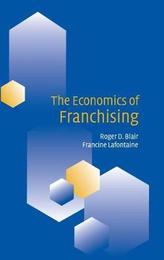
|
The Economics of Franchising
Hardback
Main Details
| Title |
The Economics of Franchising
|
| Authors and Contributors |
By (author) Roger D. Blair
|
|
By (author) Francine Lafontaine
|
| Physical Properties |
| Format:Hardback | | Pages:350 | | Dimensions(mm): Height 235,Width 159 |
|
| ISBN/Barcode |
9780521772525
|
| Classifications | Dewey:381.13 |
|---|
| Audience | | Professional & Vocational | | Tertiary Education (US: College) | |
|---|
| Illustrations |
31 Tables, unspecified
|
|
Publishing Details |
| Publisher |
Cambridge University Press
|
| Imprint |
Cambridge University Press
|
| Publication Date |
11 April 2005 |
| Publication Country |
United Kingdom
|
Description
This book describes in much detail both how and why franchising works. It also analyses the economic tensions that contribute to conflict in the franchisor-franchisee relationship. The treatment includes a great deal of empirical evidence on franchising, its importance in various segments of the economy, the terms of franchise contracts, and what we know about how all these have evolved over time, especially in the US market. A good many myths are dispelled in the process. The economic analysis of the franchisor-franchisee relationship begins with the observation that for franchisors, franchising is a contractual alternative to vertical integration. Subsequently, the tensions that arise between a franchisor and its franchisees, who in fact are owners of independent businesses, are examined in turn. In particular the authors discuss issues related to product quality control, tying arrangements, pricing, location and territories, advertising, and termination and renewals.
Author Biography
Roger D. Blair is Huber Hurst Professor in the Department of Economics at the University of Florida where he has served on the faculty since 1970. He teaches courses in antitrust economics, law and economics, and the economics of sports. Professor Blair has published 165 articles and chapters in books, primarily in economics journals and law reviews. He has served as an antitrust consultant to the U.S. Department of Justice, the Federal Trade Commission, the Attorneys General of California, Arizona, Missouri, Oregon, Washington, and Florida, and numerous corporations. The books he has coauthored include Antitrust Economics, Law and Economics of Vertical Integration and Control, Monopsony: Antitrust Law and Economics, and forthcoming from Cambridge University Press, Intellectual Property: Economics and Legal Dimensions of Rights and Remedies with Thomas F. Cotter. Francine Lafontaine is Professor of Business Economics and Public Policy and Professor of Economics at the University of Michigan Business School where she has taught since 1991. Professor Lafontaine mostly teaches applied microeconomics to MBAs, along with elective courses on firm strategy and antitrust and on the economics of franchising. She has published numerous scholarly articles on franchising in top journals in her field, including the Journal of Political Economy, the RAND Journal of Economics, the Journal of Law and Economics, the Journal of Law, Economics and Organization, and the Journal of Industrial Economics as well as in marketing and entrepreneurship journals. Professor Lafontaine is widely recognized as a world expert on the subject of franchising and as such has acted as consultant and expert witness for various companies.
Reviews'In The Economics of Franchising, Blair and Lafontaine have provided an exceptionally comprehensive and cogent treatment of franchise law and economics. They have made complex economic analysis accessible and at the same time have revealed the hidden complexity behind some of the naive misconceptions associated with franchising. But what I liked best was their ability to treat each topic with a blend of managerially relevant discussion and formal analysis. It is a book that will appeal to anyone with a business, legal or research interest in franchising.' Patrick Kaufmann, Boston University 'A book on franchising by the experts in this field is a welcome addition. It will be extremely valuable for both teachers and researchers.' Jeffrey M. Perloff, University of California, Berkeley
|